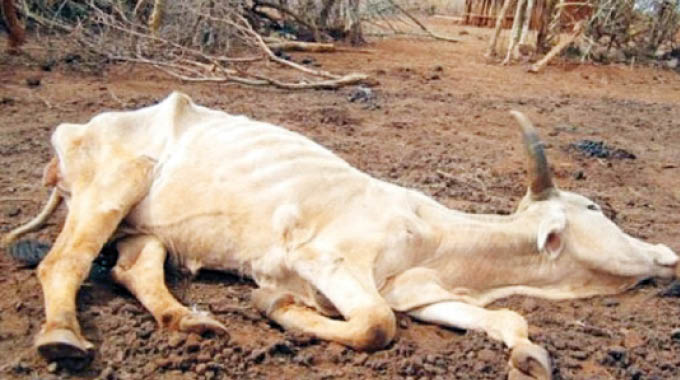Govt must assist farmers to prevent cattle deaths

Stephen Mpofu
People in Matabeleland South have lost thousands of cattle to drought as creatures at the top with one eye and one ear play deaf mutes.
A source — a Mat-Southener resident in Bulawayo but with livestock out there in the rural areas — this week charged local political leaders with failure to take meaningful steps to save cattle in that province that are part of Zimbabwe’s national herd and have in the past contributed to beef exports to the European Union, earning the country much-needed foreign currency.
Apparently, the politicians are imbued with a propensity for seeing and hearing followers dancing and singing praises that swell the pride and dysfunctional importance of the leaders who are supposed to tell the supporters the hard truth, however bitter to swallow this might sound at first, for the betterment of the constituents and the country.
[According to the latest reports from Matabeleland South, ravaged like other areas by the current devastating drought spawned by global warming, over 30 000 animals have so far succumbed to the drought with the death toll likely to increase as the current rainy season holds out little promise for better things.]
Another source — a woman from Plumtree and related to this writer, said last week during a visit to the City of Kings and Queens for medical attention that carcasses of the animals that succumbed to the drought were being burnt as a precaution against disease outbreak.
The woman who also requested anonymity, described how traumatic the animal losses were to the owners by citing a case in which one villager who virtually lost a whole herd collapsed on seeing one surviving ribby beast crawling around the village and picking out remaining blades of grass, and had to be rushed to hospital in Bulawayo.
The source resident in Bulawayo outlined measures that needed to be taken to save the remaining animals and other beasts in future from decimation by droughts.
He explained that because the sweet grass commonly found in Matabeleland remained fluffy after about June, while in other provinces, particularly in Mashonaland, the elephant grass there was sturdy and resistant to drought with shoots from stems on which animals graze in dry seasons and when rains fail.
As such, he said, the government or non-governmental bodies should consider cutting the elephant grass, bailing it in quantities not too expensive to buy and then transporting the animal feed by train to areas prone to severe droughts in the southern parts of the country for sale to cattle owners there in order to prevent further animal losses.
Furthermore, the two sources told this communicologist that goats survived the effects of drought in the province in question as they were browsers and can live off tree leaves.
The main source, who said he had already sold eight of his own cattle to remain with those that he could adequately manage went on to say the authorities might wish to re-orient the psychology of the people in the rural areas who count their wealth in terms of large cattle herds, vis-à-vis the ownership of small herds of cattle and more goats that will withstand severe drought.
To date, it is tragically ironic that we have been content with reeling out statistics about the number of beasts slaughtered by the drought but without any mention of measures to provide draught power for those who lost cattle to till their land during the current rainy season.
Which suggests that villagers are likely to experience worse food shortages and starve, what with atrocious prices charged by retailers in urban centres, and such a dismal situation might see more able bodied young Zimbabweans flocking to neighbouring states in search of greener pastures but where they do what amounts to slave labour, given the current economic meltdown in the motherland.
Curiosa and curiosa.










Comments